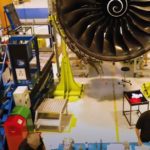BAE Systems has published initial findings on the potential economic contribution from the Tempest programme over the next 30 years.
The data represents the preliminary findings of an independent analysis by PwC on the economic contribution at the initial stages of the multi-decade programme, covering the period up to 2050.
The findings will form part of an outline business case to be handed to the government with a full report available by the end of the year. Initial data predicts the project will support an average of 20,000 jobs every year from 2026 to 2050.
Manufacturing set to commence by 2035
The Tempest programme is being delivered by Team Tempest, a UK technology and defence partnership formed by BAE Systems, Leonardo UK, MBDA, Rolls-Royce and the RAF involving hundreds of high-tech companies, SMEs and academia across the UK. The ambitious technological projects is designed to deliver a highly advanced, adaptable and affordable military combat air system which will play a key role in the nation’s defence and security. For a deep dive into the Team Tempest project and how it can create value across the supply chain, watch our FIA Connect session hosted by Sir Brian Burridge of the Royal Aeronautical Society.
A total of £2bn has been committed by the UK to the programme, with manufacturing set to commence by 2025. The combat air system is scheduled to be delivered by 2035, which has been designed for regular upgrades and is planned to last until the end of the century.
The UK defence manufacturer is hoping to generate further funding commitment to the multibillion-pound project through the business case, which will assess three options: going with Tempest; being a junior partner on an international programme; or buying an off-the-shelf fighter. The government is expected to announce its preference in the coming months and release funding for the next phase.
Project will preserve sovereign capability
The programme is expected to deliver significant benefits to the UK over its full lifetime as well as meeting military requirements. It will preserve sovereign capability while investing in highly skilled jobs, with a specific focus on young people, developing technology and infrastructure and will support the wider economy and long-term prosperity of the UK.
This initial analysis looks at the period of programme development, production, entry into service and early support, but does not include the full potential of export opportunities, R&D investment or the value of the programme beyond 2050.
Michael Christie, Director, Combat Air Acquisition Programme, BAE Systems said: “Tempest is an exciting and ambitious multi-decade programme that will help to preserve our national security whilst at the same time driving significant economic benefits for the UK. The initial analysis revealed today demonstrates that Tempest is critical to ensuring the UK can sustain its world-leading Combat Air Sector, preserving the sovereign capability that is essential to retaining military freedom of action for the UK.”
ADS: Tempest will create “new generation of talent”
Tempest is a beacon to attract engineers and technicians and a place for young people to build their careers. There are currently 1,800 people employed across UK industry and the MOD, a number that is set to increase to 2,500 next year.
ADS Chief Executive Paul Everitt added: “The Tempest programme is essential for our national security and future prosperity. The high value design and ground breaking engineering skills required for success will create a new generation of talent to drive UK industry.
“Defence programmes like Tempest offer an invaluable opportunity to secure a recovery from the current COVID-19 crisis. It will embed high-value design and manufacturing skills in the UK for decades to come, sustain thousands of high paying jobs and give apprentices the opportunity to build their career in an iconic programme with massive export potential.”
BAE Systems commissioned PwC to carry out an independent analysis of the economic impact of the Tempest programme on behalf of Team Tempest partners. In July, seven further companies signed agreements to progress opportunities to work on future combat air concepts and underpinning technologies across Team Tempest – including Bombardier Belfast, Collins Aerospace in the UK, GE Aviation UK, GKN Aerospace, Martin-Baker, QinetiQ and Thales UK.

